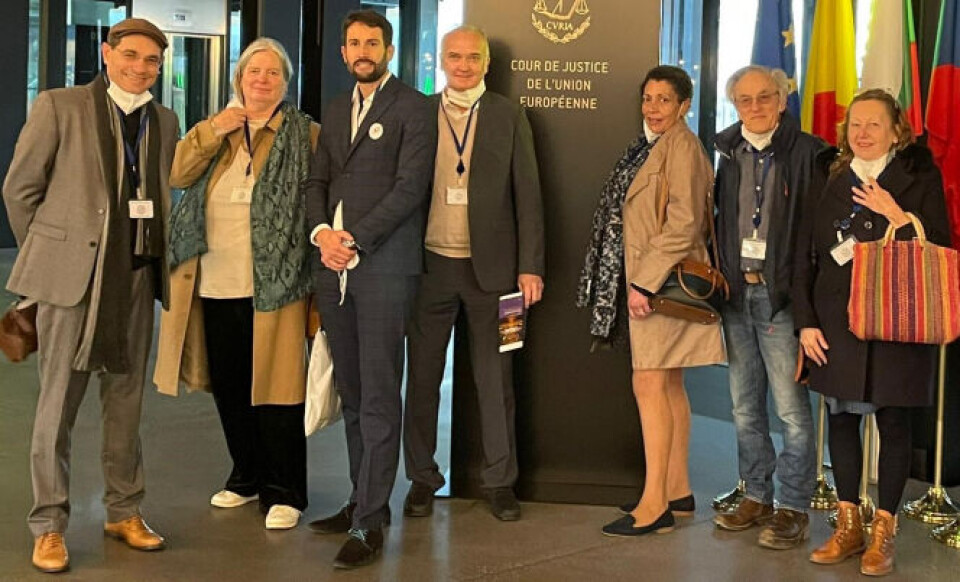-
New pink number plates in France lead to more police road checks
The plates are designed to enhance visibility and deter fraud
-
Alder pollen spike leads to warnings across most of France
Parts of the south-west at highest risk. Cypress pollen is also present along French Riviera
-
Warnings after dog poisonings in south of France countryside
More than 20 dogs, including truffle hunting animals, have been poisoned by mysterious pellets
Setback for Briton fighting to maintain EU rights post Brexit
The ECJ’s advocate general said today that Britons ceased to be EU citizens after Brexit; French lawyers say there is still hope for opposing argument

One of the French lawyers in a case seeking to maintain EU citizenship rights for Britons post-Brexit has expressed his disappointment after an unfavourable hearing in the European Court of Justice (ECJ) today (February 24).
Julien Fouchet said the court’s advocate general, Irish lawyer Anthony Collins, had failed to address their arguments.
Mr Collins stated today that Britons ceased to be EU citizens after the UK left the European Union. As a result it is normal that they no longer enjoy certain benefits of citizenship, such as the right to local election votes, he said.
French lawyers Julien Fouchet and Jean-Noël Caubet-Hilloutou, representing retired UK civil servant Alice Bouilliez, from Gers (Occitanie), argue that EU citizenship may be seen as a separate status which is not automatically lost due to Brexit. The effects of losing the associated rights caused disproportionate harm to people’s lives, they add.
Mrs Bouilliez had taken a case to the court of Auch, Gers, over the loss of her voting rights. Though married to a Frenchman, she never took French nationality. The court referred the case on to the ECJ to rule on the EU citizenship points.
The advocate general said today that “as of the entry into force of the Withdrawal Agreement, a British national no longer enjoyed the right, as a Union citizen, to vote and to stand as a candidate in municipal elections in the member state of his or her residence”.
This was “one of the consequences of the sovereign decision of the UK to withdraw from the EU”, he said.
Mr Fouchet said: “We haven’t lost because in 25% of cases the view of the advocate general is not followed by the full court [which will rule later this year].”
He added: “It’s very disappointing, however, as he didn’t address any of our arguments. He didn’t even consider that double nationality is not even allowed in some EU states, such as Spain, and that Alice couldn’t take it because she swore an oath to the Queen [as a UK civil servant].
“And all the consequences – the lack of proportion – were not even raised. Nothing, not even on the 15-year-rule in the UK which means that many Britons no longer have any right to vote anywhere. Apparently the court is not shocked by that.
“I think the advocate’s conclusions were very political.”
Mr Fouchet said however, one positive point is that Ian Forrester, a former British judge in the EU’s general court, was present at the hearing and is backing their case. Mr Forrester aims to further publicise the harm that Brexit has done to Britons due to loss of rights before the ECJ rules, Mr Fouchet said.
“I think we’ll have a decision either before or after the summer, and if it’s not the right one we will go to the European Court of Human Rights. It’s not possible to leave people in Europe without any right to vote.
“This is not definitive and people must keep their hopes up, as we will take this all the way.”
Mr Fouchet said several members of Mrs Bouilliez’ EU Britizens association were present today to support her. “There were about 15 of us in all,” he said.
- Mrs Bouilliez and other EU Britizens have made a video about why their citizenship rights matter to them.

Read more
Leaving the EU is a ‘lost opportunity’ for Britons says former European court judge
Date set for hearing for Britons’ EU citizenship case
16 judges lined up to rule on Britons’ loss of EU citizenship
























